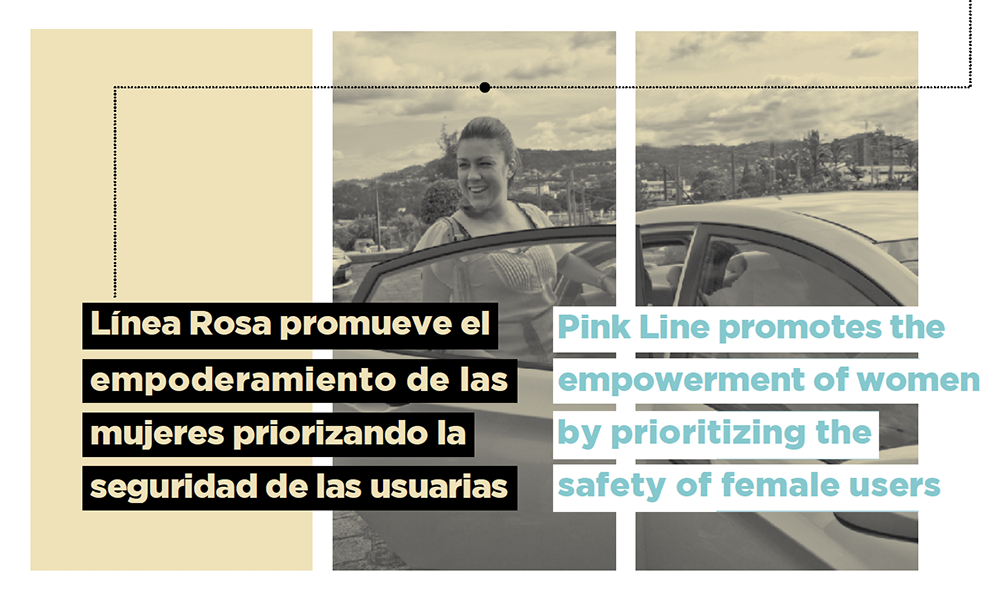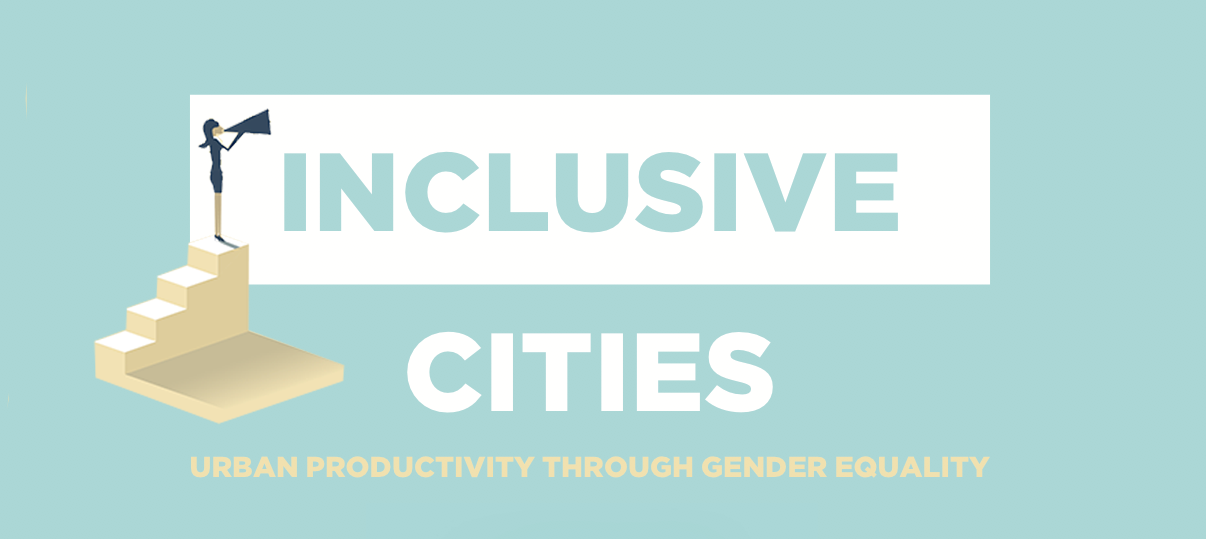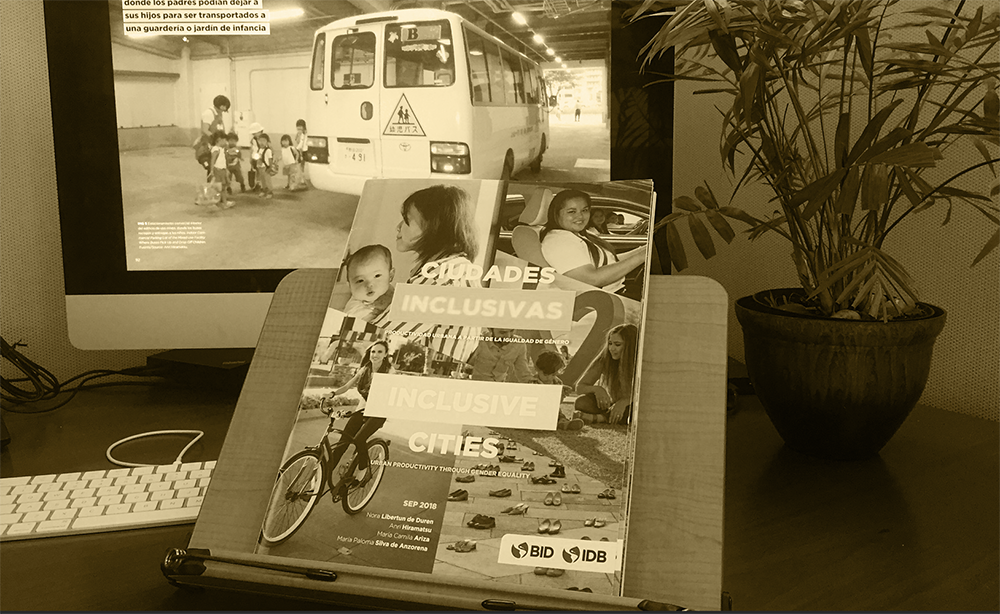Este artículo está también disponible en / This post is also available in: Spanish
The process of urbanization in Latin America—the most urbanized region on the planet—has had both positive and negative effects. On one hand, the effects of agglomeration in cities such as the concentration of employment opportunities, the diversification of human capital, and massive investment in infrastructure and public services have improved the quality of life of urban dwellers. However, the access to the benefits of urbanization has not been equitable. From a gender perspective, urban inequality disproportionately affects women. For example,, according to UN Women, female salaries are on average 19% lower than male in Latin America and Caribbean, and women have a significantly higher presence in administrative positions and the informal sector. Similarly, low-income households are often led by women who tend to live in precarious housing with difficult access to basic services and transportation systems.
Although women have advanced in the public and economic sphere, gendered divisions of labor still exist and become evident in time use surveys. Women’s unpaid household labor is on average 3.5 hours greater per day than that of men in the region (Aguirre and Ferrari, 2014; Charmes, 2015). Women, particularly working mothers who are overburdened with responsibility put their physical and mental health at risk (Southerston, 2003). For example, several working mothers have shown anxiety by being in constant rush to complete demands and coordinate multiple fragmented activities in large cities (Robeyns, 2003). This physical and mental overload affects their personal, family and professional well-being (Southerton, 2003).
Benefits of urban management with a gender perspective
Urban planning with a gender perspective not only benefits women, but also helps to improve the living conditions of people from different social groups living in cities. For example, a compact and polycentric city allows us to perform multiple daily activities—both productive and reproductive—in less time, which helps alleviate the workload for women and families. Similarly, a city that undertakes measures to improve the safety of pedestrians—such as expanded paving, sufficient lighting, and universal design—facilitates daily activities for persons with reduced mobility such as disabled and elderly people, pregnant women, mothers and families with children. Additionally, as UN Women’s Safe Cities and Public Spaces Program illustrates, creating safer cities for women, youth and girls helps strengthen social interaction in urban areas.
New publication: Inclusive Cities
Download the new publication
Aiming to show the benefits of urban planning with gender perspective, we developed a new publication titled “Inclusive Cities: Urban Productivity Based on Gender Equality”that compiles four case studies—Salvador (El Salvador), Nagareyama (Japan), Madrid (Spain), and Mexico—in which authorities and civil society organizations were able to incorporate the needs of women into urban planning, and women actively participated as active agents in the transformation of their communities. Here are some of the lessons learned from each of these cases:
- San Salvador:Given the high crime rates and the perception of insecurity that women experience in public transportation in this city, a Salvadoran entrepreneur launched “Pink Line”: a mobility service provided by women for women in 2014. This case highlights important achievements made from this inclusive transport service, such as the social and economic empowerment of women and the improvement of urban transport safety for women and children, which has led to an increase in female drivers’ self-esteem.

- Nagareyama:An aging population and a low birth rate have encouraged several Japanese municipalities to explore innovative mechanisms to sustain their economy. The municipality of Nagareyama, a city adjacent to Tokyo, implemented an integral urban plan consisting of a series of programs aimed at creating a friendly environment to attract young families under the administration of Mayor Izaki (2003-present). One of the key programs was the implementation of a comprehensive transportation system and child drop-off and pick-up center in day care centers, which has alleviated the daily burden of mothers working in the Tokyo metropolitan area.

- México : This study addresses the issue of labor inequality in Mexico, particularly in the construction and housing sectors, and suggests the need to improve working conditions for women who work in these sectors. In this context, MULIV (Women Leaders for Housing), a civil association composed of professional women was created in 2015 to promote the adoption of a gender perspective in the policies that govern these sectors. One of the main achievements of this organization has been to incorporate this vision in the criteria of infrastructure design, social services and social housing policy. The case highlights the need to develop national policies and achieve greater inter-institutional coordination that allows more women to participate in the national economy.

- Madrid: The study reveals the importance of looking at the city from the perspective of women who lived in different periods in history. Through the DIVERCITY project—an initiative led by Complutense University and with the support of the City of Madrid and the European Union—the city developed a mobile application called City of Women (“Ciudad de las Mujeres”) which seeks to become an instrument of citizen participation accessible to people from different social and cultural sectors.

As these studies show, an inclusive approach and a gender perspective towards urban development can bring great benefits and opportunities for a city. As expressed by Lefebvre (1996) and Harvey (2012), we all have “the right to the city” and, therefore, we are the protagonists of the change we wish to see in the cities we live in. Recognizing women as agents of change is key to inclusive and sustainable development. We hope that the experiences presented in this book encourage many more cities to incorporate a gender perspective into urbanism not only promoted by their governments, but also by their own citizens.
References
Aguirre R y Ferrari F. (2014). Las Encuestas sobre Uso del Tiempo y Trabajo no Remunerado en América Latina y el Caribe. La Comisión Económica para América Latina y el Caribe (CEPAL). Retrieved from: https://repositorio.cepal.org/bitstream/handle/11362/5851/9/S1420397_es.pdf
Charmes, J. (2015). Time Use Across the World: Findings of a World Compilation of Time Use Surveys. UNDP. Retrieved from: http://hdr.undp.org/en/content/time-use-across-world-findings-world-compilation-time-use-surveys
Harvey, D. (2012). Rebel Cities: From the Right to the City to the Urban Revolution. New York: Verso.
Lefebvre, H. (1996). Writing on Cities. Cambridge: MA, Blackwell.
OIT. (2018). Perspectivas Sociales y del Empleo en el Mundo: Avance Global sobre las Tendencias del Empleo Femenino 2018. Retrieved from: https://www.ilo.org/global/research/global-reports/weso/trends-for-women2018/WCMS_619603/lang–es/index.htm
ONU Mujeres. (2015). El Progreso de las Mujeres en el Mundo 2015-2016.Retrieved from: http://progress.unwomen.org/en/2015/pdf/SUMMARY_ES.pdf
Robeyns, I. (2003). Sen’s capability approach and gender inequality: selecting relevant capabilities. Feminist Economics, Vol 9 (2-3): 61-92
Southerton, D. (2003). “´Squeezing Time´ Allocating Practices, Coordinating Networks and Scheduling Society “. Time & Society. Vol 12 (1): 5-25.
Edición: Andreina Seijas trabajó para la Iniciativa de Ciudades Emergentes y Sostenibles (ICES) y posteriormente para la División de Vivienda y Desarrollo Urbano del BID desde noviembre de 2013 hasta julio de 2017. Andreina es comunicadora de la Universidad Católica Andrés Bello (Caracas) y cuenta con maestrías en Política Social y Desarrollo (LSE) y Administración Pública (NYU). Actualmente se encuentra realizando un doctorado en la Harvard Graduate School of Design, donde se especializa en temas de planificación urbana nocturna.



Leave a Reply